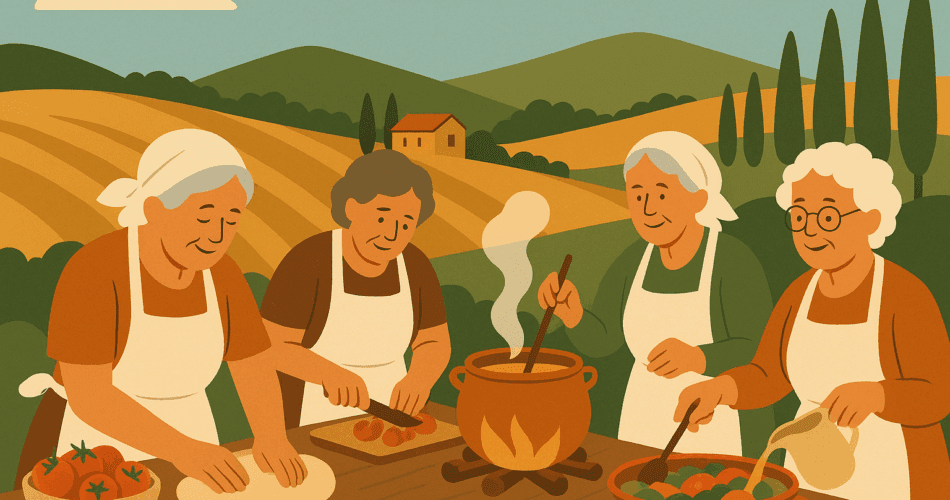Why Nonna Is the Movie We Didn’t Know We Needed
Last night, on what I usually call “hump day,” I found myself scrolling through my Netflix feed, looking for something—anything—that would lift the midweek fog. It had been a long day at work, filled with meetings, obligations, and the kind of everyday stress that wears you down slowly. Earlier that day, I’d seen an article headline about a movie called Nonna. I didn’t get a chance to read it, but the title lingered in my mind. There was something about it that felt warm. Familiar.
So after dinner, I made the executive decision: Nonna would be our family movie night pick. No one argued. We made popcorn, dimmed the lights, and settled in. I had no idea what to expect—but what unfolded on that screen was a story that quietly, yet powerfully, touched our hearts.
Nonna isn’t flashy. It doesn’t rely on big-budget effects, twisted plots, or edge-of-your-seat suspense. Instead, it’s grounded. Raw. Real. The kind of storytelling we don’t see nearly enough anymore.
A Story of Grief, Grace, and Grit
The film follows Joe Scaravella, a Staten Island native who, after the tragic loss of his mother, found himself searching for meaning in the aftermath of grief. Rather than spiraling, Joe made a choice—a brave and unexpected one. He decided to open a restaurant. But not just any restaurant. He built something sacred, something healing: Enoteca Maria, a place where grandmothers from all over the world come together to cook traditional meals from their homelands.
Each night, a different nonna (Italian for grandmother) takes over the kitchen, preparing food from the recipes passed down through generations. The food is real. The women are real. And their stories? Heartbreaking, uplifting, human.
The Characters That Make It Unforgettable
Joe himself is the heart of the film. He’s not portrayed as a polished entrepreneur or a culinary genius. He’s simply a man led by his heart. You watch him grapple with sorrow, self-doubt, and the kind of loneliness that only loss can bring. But what makes Joe unforgettable is his vulnerability. He doesn’t pretend to have it all figured out. He just keeps showing up—with love, with humility, with open arms.
And then there are the nonnas. These women stole the show for me. Each one brings her own unique flavor—not just to the dishes, but to the soul of the story. There’s Nonna Rosa, who left Italy decades ago but still remembers the scent of her childhood village. Nonna Carmen, who tells stories of surviving hardship with a grace that brought tears to my eyes. Nonna Ling, who introduced a dumpling recipe that became a metaphor for healing across cultures.
What struck me most was how these women—often overlooked in our fast-paced, youth-driven culture—were given center stage. They weren’t treated as background characters. They were the story.
My family and I found ourselves pausing the movie just to talk about them. “She reminds me of Grandma,” my daughter said at one point. And she did. They all did. In some way, they represented not just our elders, but the wisdom, strength, and resilience of generations before us.
A Gentle Reminder of What Matters
There’s a moment in the film where Joe sits with one of the grandmothers as she tells her story in a quiet kitchen, rolling dough by hand. It’s slow. Unhurried. And in that simplicity, something sacred happens. You’re reminded of what matters: connection, tradition, community.
This film doesn’t rely on violence, sex, or high drama to tell a compelling story—and that’s exactly why it works. It’s a reminder that ordinary people, living ordinary lives, can be extraordinary in how they overcome pain, how they love, and how they choose to keep going.
The Moral: Turn Pain Into Purpose
What Nonna ultimately teaches us is this: grief can break you, but it can also shape you. Joe took something deeply painful—the death of his mother—and transformed it into a living tribute. He didn’t try to erase his sorrow. He honored it. And in doing so, he built something beautiful that now brings joy and connection to others.
That’s the heart of the story: turning loss into legacy. Taking what hurts and using it to bring people together. Creating meaning in the face of emptiness.
As someone who grew up watching films with larger-than-life plots and often unrealistic portrayals of love, success, or hardship, Nonna felt like a breath of fresh air. It didn’t scream. It whispered. And I heard every word.
I wish more movies would take this route—telling stories that reflect the quiet strength of real people. Stories that highlight human kindness, intergenerational love, and the power of community. We don’t need another violent thriller or over-the-top romantic saga. We need more reminders that even in our messiness, we are still capable of grace.
Watching Nonna reminded me how powerful storytelling can be when it’s rooted in truth. It reminded me of the resilience of the human spirit and the unexpected beauty that can bloom in the most unlikely places.
So if you’re looking for something heartfelt, genuine, and healing, I urge you to watch Nonna. You won’t regret it.
And to Joe Scaravella—thank you. Thank you for sharing your story. Thank you for honoring the women who raised us. And thank you for reminding us that even in grief, there is grace.

